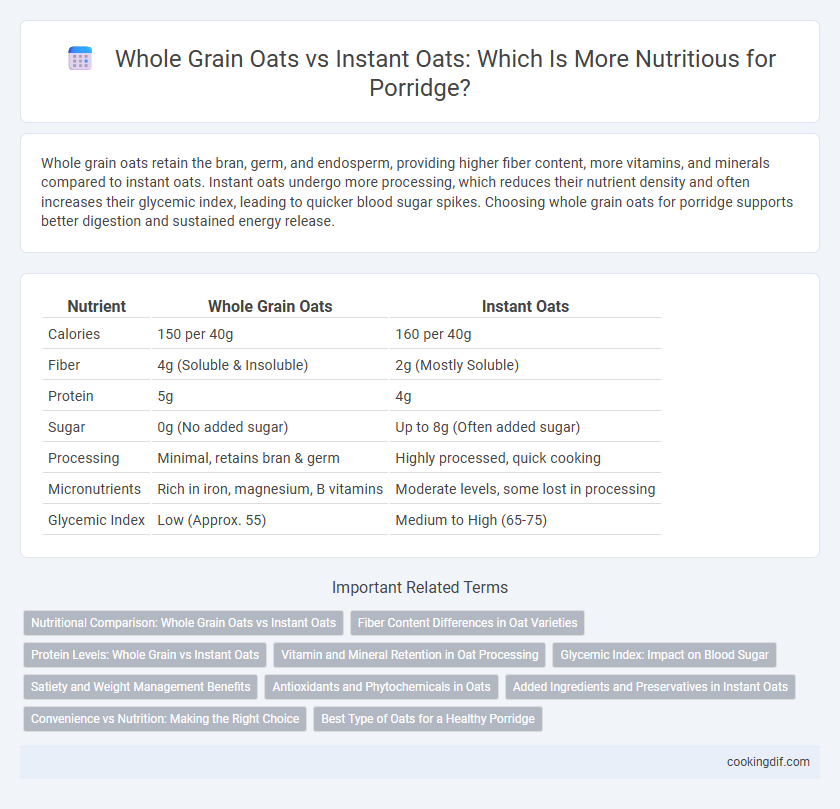Whole grain oats retain the bran, germ, and endosperm, providing higher fiber content, more vitamins, and minerals compared to instant oats. Instant oats undergo more processing, which reduces their nutrient density and often increases their glycemic index, leading to quicker blood sugar spikes. Choosing whole grain oats for porridge supports better digestion and sustained energy release.
Table of Comparison
| Nutrient | Whole Grain Oats | Instant Oats |
|---|---|---|
| Calories | 150 per 40g | 160 per 40g |
| Fiber | 4g (Soluble & Insoluble) | 2g (Mostly Soluble) |
| Protein | 5g | 4g |
| Sugar | 0g (No added sugar) | Up to 8g (Often added sugar) |
| Processing | Minimal, retains bran & germ | Highly processed, quick cooking |
| Micronutrients | Rich in iron, magnesium, B vitamins | Moderate levels, some lost in processing |
| Glycemic Index | Low (Approx. 55) | Medium to High (65-75) |
Nutritional Comparison: Whole Grain Oats vs Instant Oats
Whole grain oats retain the bran and germ, offering higher fiber content, essential vitamins like B-complex, and minerals such as iron and magnesium compared to instant oats. Instant oats undergo more processing, resulting in reduced fiber and nutrient density but faster cooking time. Choosing whole grain oats supports better blood sugar regulation and sustained energy release due to their complex carbohydrate structure.
Fiber Content Differences in Oat Varieties
Whole grain oats contain significantly higher fiber content compared to instant oats, providing around 4 grams of fiber per 40-gram serving versus 2 to 3 grams in instant oats. The minimal processing of whole grain oats preserves the bran layer, which is rich in both soluble and insoluble fiber, essential for digestive health and sustained energy release. Instant oats undergo more processing, leading to a reduction in fiber concentration and a higher glycemic index, which can affect blood sugar regulation.
Protein Levels: Whole Grain vs Instant Oats
Whole grain oats contain higher protein levels, typically around 13-15 grams per 100 grams, compared to instant oats that have about 10-12 grams per 100 grams due to processing. The minimal processing of whole grain oats helps retain more of the natural protein content and essential nutrients. Instant oats, while convenient, often undergo processing that reduces protein concentration and can add sugars or additives, impacting overall nutritional value.
Vitamin and Mineral Retention in Oat Processing
Whole grain oats retain higher levels of vitamins and minerals such as magnesium, zinc, and B vitamins compared to instant oats, which undergo more extensive processing that reduces nutrient density. The minimal processing of whole grain oats preserves the bran and germ layers, protecting essential micronutrients from degradation. Instant oats often experience heat and moisture treatments that can diminish vitamin content, making whole grain oats a superior choice for optimal nutrient retention in porridge.
Glycemic Index: Impact on Blood Sugar
Whole grain oats have a lower glycemic index (GI) compared to instant oats, resulting in a slower and more stable release of glucose into the bloodstream. This slower digestion helps maintain steady blood sugar levels and reduces insulin spikes, beneficial for managing diabetes and supporting sustained energy. Instant oats, processed for quick cooking, have a higher GI that causes a rapid increase in blood sugar, making them less ideal for glycemic control.
Satiety and Weight Management Benefits
Whole grain oats contain higher fiber content and a lower glycemic index compared to instant oats, promoting prolonged satiety and better blood sugar control. The slower digestion of whole grain oats helps reduce hunger and supports weight management by stabilizing energy levels. Consuming whole grain oats instead of instant oats can enhance feelings of fullness and reduce overall calorie intake throughout the day.
Antioxidants and Phytochemicals in Oats
Whole grain oats retain higher levels of antioxidants and phytochemicals such as avenanthramides and phenolic acids compared to instant oats, which undergo more processing that reduces these beneficial compounds. Avenanthramides contribute to anti-inflammatory and heart-protective effects, while phenolic acids provide antioxidant benefits critical for reducing oxidative stress. Choosing whole grain oats supports optimal intake of these nutrients, enhancing the overall nutritional quality of porridge.
Added Ingredients and Preservatives in Instant Oats
Whole grain oats retain their natural fiber, vitamins, and minerals without added sugars or preservatives, making them a nutrient-dense choice. Instant oats often contain added sugars, artificial flavors, and preservatives to enhance taste and shelf life, which can reduce their overall nutritional value. Choosing whole grain oats ensures a purer source of energy and supports better blood sugar control compared to processed instant varieties.
Convenience vs Nutrition: Making the Right Choice
Whole grain oats retain their bran and germ, providing higher fiber content, vitamins, and minerals essential for sustained energy and digestive health. Instant oats offer unparalleled convenience with quick cooking times but often undergo processing that reduces nutrient density and may include added sugars or sodium. Choosing whole grain oats supports optimal nutrition, while instant oats serve well for fast preparation when time is limited.
Best Type of Oats for a Healthy Porridge
Whole grain oats retain the bran and germ, providing higher fiber, protein, and essential nutrients like vitamins B and E compared to instant oats, which are often processed and stripped of these components. Their slower digestion helps regulate blood sugar and supports sustained energy release, making them ideal for a healthy porridge. Choosing whole grain oats maximizes nutrient density and promotes better digestive health over instant varieties.
Whole grain oats vs instant oats for nutrition Infographic

 cookingdif.com
cookingdif.com